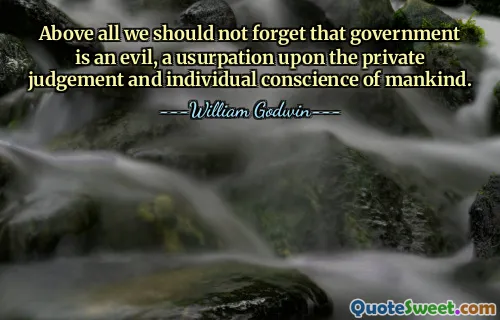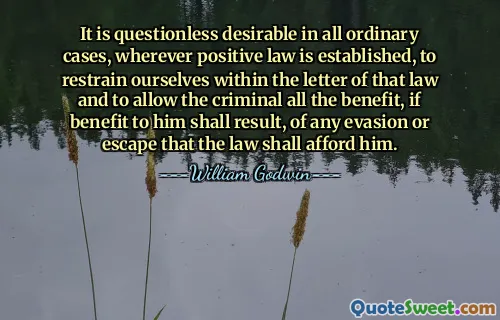William Godwin was an influential philosopher and writer from the late 18th to early 19th century, known for his radical ideas on politics, society, and human nature. He is often considered one of the first proponents of anarchism and was a prominent figure in the Romantic movement. Godwin's major work, "Political Justice," argued for a society based on reason and individual liberty, rejecting institutionalized authority and advocating for social reform through rational discourse. His thoughts challenged the status quo and inspired later thinkers, shaping modern political philosophy. In addition to his political theories, Godwin explored themes of morality, education, and the potential for human improvement. His belief in the capability of individuals to reason and govern themselves contrasted sharply with the prevailing views of his time, which emphasized hierarchy and control. Godwin’s writings suggested that societal progress could be achieved through enlightenment and the cultivation of intellectual freedoms, making significant contributions to liberal and democratic thought. Godwin's personal life also intertwined with his philosophies, particularly through his marriage to the pioneering feminist Mary Wollstonecraft. Their partnership fostered an environment of intellectual exchange, influencing both their works. Godwin's legacy endures not only through his literary contributions but also through the ideals of individualism and critique of authority that he championed. His ideas continue to resonate in contemporary discussions about governance, ethics, and social justice.
William Godwin was an influential philosopher and writer, known for his radical ideas on politics and society during the late 18th and early 19th centuries. He is considered one of the first proponents of anarchism and was a key figure in the Romantic movement. His major work, "Political Justice," advocated for a society grounded in reason and individual liberty, opposing institutionalized authority.
Godwin explored themes of morality, education, and human improvement, stressing the importance of individual reasoning. He believed society could progress through enlightenment and intellectual freedom, which contrasted sharply with the hierarchical views of his contemporaries. His writings laid the groundwork for modern liberal and democratic thought.
His personal life intertwined with his philosophies, especially through his marriage to Mary Wollstonecraft, a pioneering feminist. Their relationship fostered an exchange of ideas that influenced both their works. Godwin's legacy remains in discussions about governance, ethics, and social justice, highlighting the enduring impact of his thoughts on individualism and authority critique.
More »
Today Birthdays
1955 -
Max Lucado
1946 -
John Piper
1842 -
William James
1907 -
Abraham Joshua Heschel
1887 -
Aldo Leopold
1755 -
Alexander Hamilton
1976 -
Alethea Kontis
1971 -
Mary J. Blige
1825 -
Bayard Taylor
1943 -
Jim Hightower
1885 -
Alice Paul
1923 -
Carroll Shelby
1928 -
David L. Wolper
1954 -
Kailash Satyarthi
1972 -
Amanda Peet
1946 -
Naomi Judd
1970 -
Malcolm D. Lee
1955 -
Christian Marclay
1973 -
Rahul Dravid
1987 -
Jamie Vardy
1942 -
Clarence Clemons
1992 -
Fatima Sana Shaikh
1948 -
Larry Harvey
1930 -
Rod Taylor

